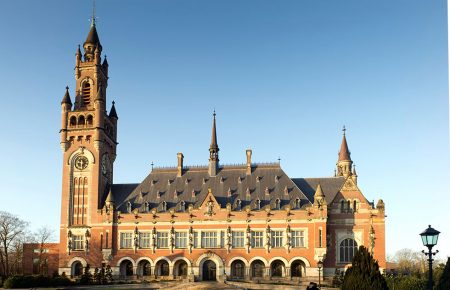Verdict in Kulbhushan Yadav case by International Court of Justice 22/07/2019 – Posted in: Daily News – Tags: Consular Access
INTERNATIONAL COURT OF JUSTICE
For: Preliminary & Mains
Topics covered: Kulbhushan Yadav Case, International Court of Justice, Consular Access
News Flash
The International Court of Justice stayed the execution of Kulbhushan Jadhav by Pakistan.
- ICJ in the Hague, directed Pakistan to stay his execution and allow him consular access.
Background
- Kulbhushan Yadav had been arrested in Pakistan’s restive province of Balochistan in 2016.
- He had been accused of terrorism, spying, and fomenting trouble in Balochistan.
- Yadav was sentenced to death by a Pakistani military court in 2017.
The International Court of Justice
- International Court of Justice was established in June 1945 by the Charter of the United Nations and began work in April 1946.
- It is the principal judicial organ of the United Nations (UN).
- The Court is composed of 15 judges, who are elected for terms of office of nine years by the United Nations General Assembly and the Security Council.
- The seat of the Court is at the Peace Palace in The Hague (Netherlands).
- It is assisted by a Registry, its administrative organ. Its official languages are English and French.
- The Court’s role is to settle, in accordance with international law, legal disputes submitted to it by States and to give advisory opinions on legal questions referred to it by authorized United Nations organs and specialized agencies.
- The ICJ is the successor of the Permanent Court of International Justice (PCIJ), which was established by the League of Nations in 1920 and began its first session in 1922.
Consular Access
- India had demanded consular access to Jadhav under the rules of the Vienna Convention on Consular Relations of 1963.
- This is an international treaty that defines consular relations between independent states.
- A consul, who is not a diplomat, is a representative of a foreign state in a country and works for the interests of his countrymen in the host country.
- Article 36 of the Vienna Convention states that foreign nationals who are arrested or detained be given notice without delay of their right to have their embassy or consulate notified of that arrest.
- If the detained foreign national so requests, the police must fax that notice to the embassy or consulate, which can then check up on the person.
- The notice to the consulate can be as simple as a fax, giving the person’s name, the place of arrest, and, if possible, something about the reason for the arrest or detention.
Source: Livemint
You can follow us on LinkedIn and on Instagram (Diligent IAS) for more updates related to IAS Preparation/ Study Material, Subscribe to our Facebook Page and Youtube Channel- Diligent IAS
Also, read more Daily News Updates
- “Sex Ratio at Birth” Drops in India
- Bimal Jalan Committee Report on Reserve Bank of India’s Capital
- Ramanujan Machine
- Singapore International Commercial Court
- Dibang Multipurpose Project
- Ploonet – A moon that becomes a planet
- Whip

